Neighbours Interview – 2003
What did your job as story editor on Neighbours entail?
I actually became what is now known as Script Supervisor, which meant that the scripts were my responsibility from story through to final drafts. We had an excellent story-lining team of five, a mixture of male and female and a good range of ages, most of whom also wrote scripts. In addition we used a few freelance writers.
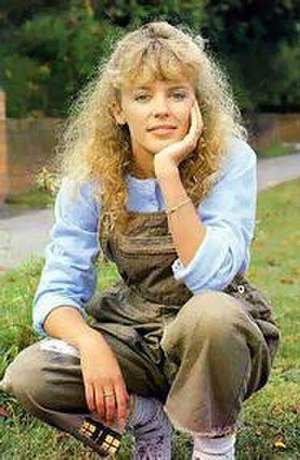 Can you take us through the process of writing a typical episode of Neighbours?
Can you take us through the process of writing a typical episode of Neighbours?
Most of the stories began with me or in general discussion, then I developed them with the story-lining team. Together we would shape them into episodes for each specific night, then the story-liners would type up scene breakdowns (a detailed scene-by-scene description of each episode). The two script-editors would comment on the scene breakdowns and amendments would sometimes be made. I would do a final edit of these, then the scripts would be written, heavily based on the breakdowns. The scripts would be edited by the two script-editors, and I would do a final over-edit, then – hopefully – they were ready to be shot. However, there were often last-minute adjustments that had to be made, or sometimes panicky rewrites if a member of the cast met with an accident or was taken ill.
Are there any characters you have been personally responsible for creating?
Yes, over the ten years I was in charge of the scripts I created many, many characters. One was Mrs Mangel. She was brought in originally as a ‘daily’ (that is, a character who only appears in one episode) to be a difficult customer at the coffee shop. I immediately sensed that such a character could be very useful on a long-term basis and so Mrs Mangel, as we came to know her, was born. Vivean Gray was wonderful in the part. If I recall correctly I also created Jane Harris, Joe Mangel, Kerry Bishop, Mike Young, Dorothy Burke, Lou Carpenter and dozens of others. To be fair, when I say I created them, I mean I suggested the core character. The details of the characterisations were worked out with the whole team of story-liners and editors. I don’t think you could truthfully say that any one character was completely created by only one person, except for the very original characters who were the invention of Reg Watson, the creator of the show. Charlene was a character that Reg Watson had in mind for a long time before she appeared. The story-editor at that time, Ginny Lowndes, had a lot of input into her character as did I. Reg also suggested Harold Bishop and I remember we had a lot of trouble getting his character right. He had to be a moralistic, pompous do-gooder – but loveable! That was a hard combination to pull off. But we – and particularly Ian Smith – managed to make it work. I remember that when we first started writing Harold we deliberately made his dialogue very pompous, using long, involved sentences and always taking the longest way to say the shortest thing. Ian Smith approached me and suggested that we just give Harold normal dialogue and that we let him add the pomposity in his performance. He pointed out that if it was both in the writing and the performance it became too much. He was perfectly right and we pulled back in the dialogue and let the actor do his job.
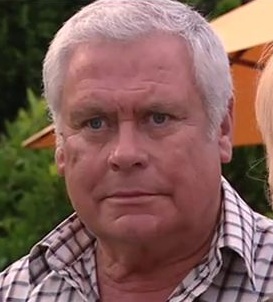 Who have been your favourite characters to write for, both past and present, and why?
Who have been your favourite characters to write for, both past and present, and why?
That’s hard to answer because there have been so many: Off the top of my head, I think my particular favourites have been Harold Bishop, Madge Bishop, Mrs. Mangel, Charlene, Henry Ramsay, Des Clarke, Eileen Clarke, Paul Robinson, Kerry Bishop, Lou Carpenter, Dorothy Burke, Toadie Rebecchi, Susan and Karl Kennedy. I’d say the reason I’ve enjoyed writing these characters so much is that they were all such colourful, strongly-defined characters, played by incredibly talented actors. I also have a special fondness for Helen Daniels. Anne Haddy (Helen) had played the romantic lead in the first Homicide episode I ever wrote, then later she was Rosie in Sons and Daughters, so I felt a certain sense of history with her. Like the others I’ve mentioned (and many I haven’t), Anne never let a scene down, never ‘walked through’ an episode. She always gave her all, right up to the time she had to be written out because of illness. I had known Anne Charleston (Madge) since Bellbird days. She had played a young nurse in that show. I should mention that Maggie Dence (Dorothy Burke) was a favourite with myself and the story-liners because she was the only actor involved with the show who would regularly contact us and thank us for her stories. We usually only heard from most of them to complain! Though Ian Smith was always very writer-friendly also, and in fact wrote quite a few episodes himself. He had also been a script-editor on Prisoner – as well as stage actor and singer – a truly multi-talented man.
Do you have any scenes or moments you wrote that you were particularly pleased with, and why?
 Myra De Groot as Eileen Clarke gave us a terrific scene after she’d been jilted by Malcolm (from whom she was divorced, but about to re-marry). We’d plotted it so that the character was tearful and devastated. Myra decided that Eileen’s overwhelming feeling would be rage that this man had done it to her again (he had walked out on her when they were married). Instead of simply bursting into tears of self-pity, Myra upturned a coffee table and flung it across the room. It was a shocking, but wonderfully dramatic moment that I have never forgotten. Also Harold and Madge have given us many wonderful moments. I remember in particular the story where Harold began to have feelings for another woman, Robyn Taylor – played by the wonderful Gerda Nicholson, who died far too young. Ian Smith was outraged when we told him Harold was to ‘lust in his heart’ for someone other than Madge, but when he finally saw the story he admitted it really worked and he, Anne Charleston, and Gerda all gave beautiful performances in it. I must say I loved almost everything Kylie Minogue did as Charlene. The minute she came on the screen just lit up. I knew immediately she would one day be a big star, but I expected it to be as an actress not a singer! There are just too many other moments I have loved to go into here – you wouldn’t have the room.
Myra De Groot as Eileen Clarke gave us a terrific scene after she’d been jilted by Malcolm (from whom she was divorced, but about to re-marry). We’d plotted it so that the character was tearful and devastated. Myra decided that Eileen’s overwhelming feeling would be rage that this man had done it to her again (he had walked out on her when they were married). Instead of simply bursting into tears of self-pity, Myra upturned a coffee table and flung it across the room. It was a shocking, but wonderfully dramatic moment that I have never forgotten. Also Harold and Madge have given us many wonderful moments. I remember in particular the story where Harold began to have feelings for another woman, Robyn Taylor – played by the wonderful Gerda Nicholson, who died far too young. Ian Smith was outraged when we told him Harold was to ‘lust in his heart’ for someone other than Madge, but when he finally saw the story he admitted it really worked and he, Anne Charleston, and Gerda all gave beautiful performances in it. I must say I loved almost everything Kylie Minogue did as Charlene. The minute she came on the screen just lit up. I knew immediately she would one day be a big star, but I expected it to be as an actress not a singer! There are just too many other moments I have loved to go into here – you wouldn’t have the room.
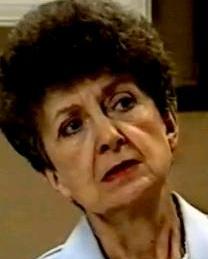 Is there a particular era of the show that you most enjoyed?
Is there a particular era of the show that you most enjoyed?
I’d say 1986 to about 1992. That was the really golden period as far as I’m concerned.
In 1988, at the height of the show’s success, you co-wrote a prequel novel, The Ramsays: A Family Divided with your fellow Neighbours writer, Valda Marshall. Can you tell us a little about that? Where there ever plans to do more books?
I think Grundy’s were approached by the publisher and asked to do two books. Reg Watson, the creator of Neighbours was too busy to do them himself, so he asked Valda and I if we would be interested. We were and went ahead. Unfortunately, the books didn’t sell particularly well in Australia – though they did better in the UK, I believe. Valda and I very much enjoyed doing them as we felt so closely involved with the characters at that time. The writers’ credits on the published books were somewhat muddled as I recall, mentioning Valda as author in one place and me in another.
1996 saw a much needed revamp to the series, which included the returns of favourites Madge and Harold. During this period, you acted as story consultant. What were your duties at that time, and what are your memories of that revamp? Were you pleased to have Madge and Harold back?
I was brought in as a consultant because the show was floundering a little. My job was to try to get the program back on its feet and support the newly-appointed story-editor, Scott Taylor. I felt that part of the reason for the drop in ratings was that many of the characters were fairly bland and the show had gone very ‘young’, focusing almost entirely on the teenagers. I insisted that we bring back Madge and Harold. I had been very reluctant to write Harold out of the show years before and had only done so under instructions from management. As Barbara Angell said in her interview, we deliberately wrote him out in a way so that we could bring him back at a later date. I was prepared to accept the inevitable scorn that would be thrown at us by the critics for having a ‘dead’ character return. I felt it was worth it. When I came in as consultant, I had them rewrite about six weeks of scripts because I didn’t think the storylines were strong enough (we couldn’t go back further than that without throwing the production into chaos). We – Scott and I and the then team of story-liners – tried to come up with stories that were more adult and had some excitement and edge to them. We must have succeeded because the rating improved considerably.
Can you tell us about scripting Helen’s final episode? How did it feel writing the last episode to feature the show’s most enduring character and final original cast member?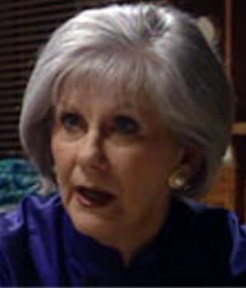
Writing Helen’s last episode was very messy! I wrote three versions in all, then the version that finally went to air had to have many last-minute adjustments. The powers-that-be felt that as Anne Haddy was far from well, we should write her out quietly by sending her off on a cruise from which she simply never returned. I strongly disagreed with this. I believed that to write such an important character out we had to have her die and give her her due with the full funeral and all the resultant sadness and memories. We battled about it. They pointed out that if the actress died – which we knew was a very real possibility – before the episode was aired, it would be in very poor taste to then have it go to air. They also felt that they couldn’t ask an actress in such ill-health to play a death scene (too close to home!) In the face of this argument, I gave way – Helen would go on a never-ending cruise. When Anne Haddy saw the script, however, she hated this idea as much as I had and insisted she must have her death scene. She won the day and I wrote a script with her dying quietly at home surrounded by her loved ones. I think it was a good script, really touching. But then Anne became so ill she was unable to continue and we had to write her out of the episodes that were in the studio. She was hospitalised and it seemed pretty clear she would not be able to come back to do any more scenes. We reworked several weeks of scripts with Helen off-screen in hospital – as was the reality – and I rewrote the script in which Helen died so that the family got word from the hospital that she was failing and rushed there, but too late – Helen had passed away. This version was shot, and Rebecca Ritters as Hannah Martin gave a stunning performance, collapsing at the news of Helen’s death. That performance was never seen on air. Anne Haddy rallied, and – wonderful trooper that she was – insisted that she play Helen’s death scene. There was frantic rewriting and re-shooting to accommodate this. My original script no longer existed, having been written over in the computer with the new version, so it was hastily rewritten. I think because of the haste of it all, the episode didn’t have the full impact that I felt it should have. However, it did to everyone associated with the program because we knew how very ill Anne was. Neighbours had become her life and it was with great sadness she left the show. She died not too long after.
But then Anne became so ill she was unable to continue and we had to write her out of the episodes that were in the studio. She was hospitalised and it seemed pretty clear she would not be able to come back to do any more scenes. We reworked several weeks of scripts with Helen off-screen in hospital – as was the reality – and I rewrote the script in which Helen died so that the family got word from the hospital that she was failing and rushed there, but too late – Helen had passed away. This version was shot, and Rebecca Ritters as Hannah Martin gave a stunning performance, collapsing at the news of Helen’s death. That performance was never seen on air. Anne Haddy rallied, and – wonderful trooper that she was – insisted that she play Helen’s death scene. There was frantic rewriting and re-shooting to accommodate this. My original script no longer existed, having been written over in the computer with the new version, so it was hastily rewritten. I think because of the haste of it all, the episode didn’t have the full impact that I felt it should have. However, it did to everyone associated with the program because we knew how very ill Anne was. Neighbours had become her life and it was with great sadness she left the show. She died not too long after.
 How did you approach writing Madge’s funeral episode, given that there was obviously going to be many notable absences, such as Charlene and Henry? Many fans were upset that there was no reference to the kids or any of Madge’s family – why was the decision made to leave such references out?
How did you approach writing Madge’s funeral episode, given that there was obviously going to be many notable absences, such as Charlene and Henry? Many fans were upset that there was no reference to the kids or any of Madge’s family – why was the decision made to leave such references out?
I was working only as a writer at this stage. I had no input into the plotting of the material, I just had to work from the scene breakdown I was given. I imagine the reason behind leaving out the references to the absence of so many family members was that it would have simply highlighted the fact they were not there. It would have been impossible – for budgetary and other practical reasons – to get so many of the old cast back.
What other projects have you been involved with, besides Neighbours?
I have worked on (as writer, story-editor or script-editor – or sometimes all three) for about 25 television shows in all, a mixture of series and serials. I have also had three stage musicals and one play produced. The play was produced in the UK at The Mill Theatre in Sonning . It was very successful there and was to move to the West End, but – for reasons too numerous to mention – it never got there.
What do you think of the recently announced impending returns of David and Sky Bishop, two characters who were last seen in 1988 and 1991, respectively? Do you think Neighbours should use its rich history and heritage more? Are there any characters from the past that you would particularly like to see return? 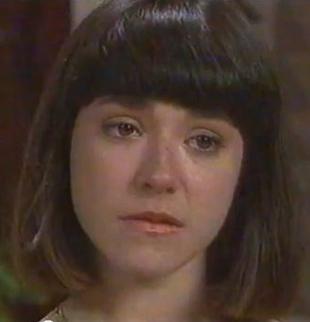
I was delighted to see them bringing back characters from the show’s history. It has worried me for some time that there was really no one involved with the show now who would know the history of the show beyond the last few years – except for Jan Russ the casting director, who has been with the show from the beginning or soon after. However, someone has obviously been delving into the history to come up with Sky. The problem with bringing back successful past characters is that most of the actors have moved onto other things and would not be available. I don’t really see the point of using the characters again unless they can be portrayed by the same actors who made them successful in the first place. Of course, if the character was last seen as a child, then recasting is perfectly acceptable. They could also bring back the character of Toby Mangel.
The new executive producer, Riccardo Pellizzeri, has set out some clear ideas on the direction he wants to take Neighbours next, which has been largely welcomed by fans. What do you think the coming year(s) hold for Neighbours?
Let’s wait and see. I couldn’t hazard a guess at this stage.
 What have you most enjoyed about your long involvement with Neighbours?
What have you most enjoyed about your long involvement with Neighbours?
For the first seven of the ten years that I was Script Producer (or Script Supervisor was the title then), I was in love with the show and the characters. I found them a joy to create stories for. Since then the show has not had quite the same strength of overall cast.
What do you think accounts for the huge success Neighbours has enjoyed?
I think it’s the strength and attractiveness of the cast, and perhaps most importantly the strength of the stories. It’s basically a sunny, feel-good show with identifiable characters and a certain nostalgia for a sense of community that doesn’t really seem to exist these days. I hope it keeps running for another eighteen years!
28th June 2003
